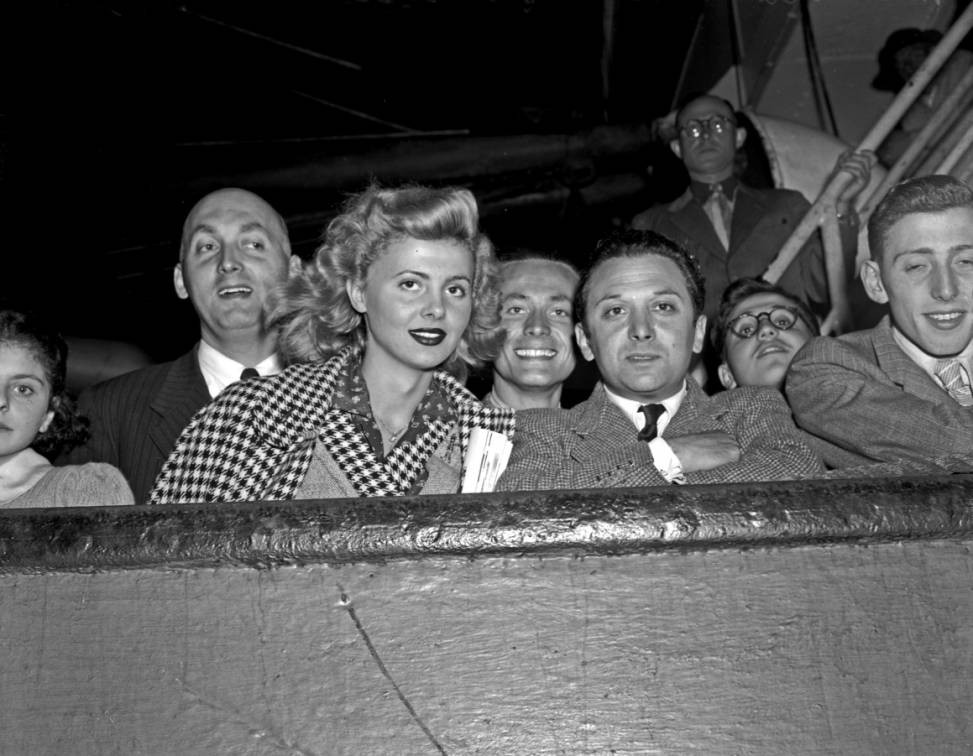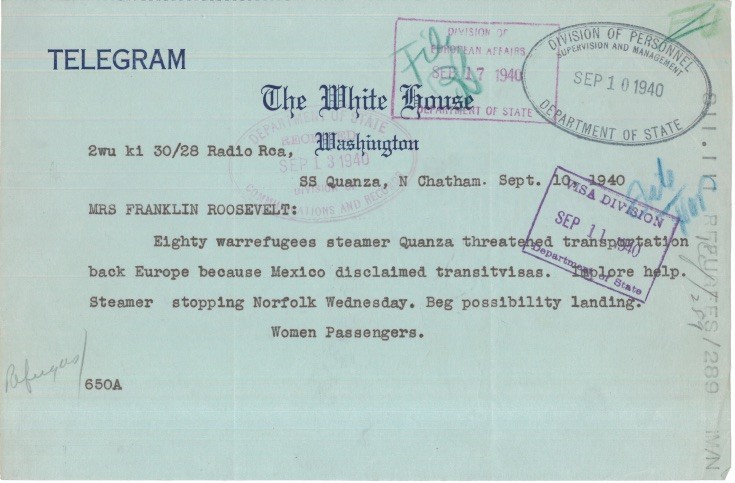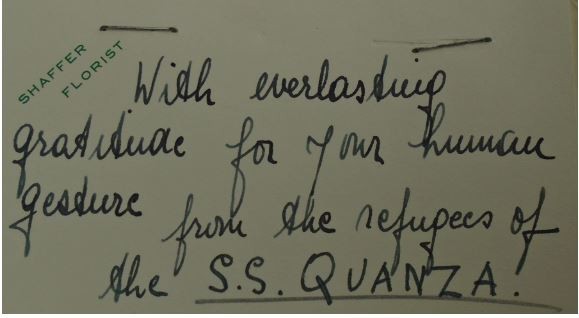
Jewish Refugees Aboard the SS Quanza
The SS Quanza was a Portuguese ship chartered by 317 Jewish refugees attempting to escape Nazi-dominated Europe in August 1940. Passengers with valid visas were allowed to disembark in New York and Veracruz, but that left 81 refugees seeking asylum. Their request to land in the USA triggered a political and legal battle between First Lady Eleanor Roosevelt and Assistant Secretary of State Breckinridge Long.
The SS Quanza left Lisbon on August 9, 1940, bound for Veracruz, Mexico, by way of New York. Most of the 317 passengers on board the Portuguese-owned ship were Jewish refugees fleeing Nazi-dominated Europe following the fall of France earlier that summer. Passengers with valid visas were allowed to disembark in New York and Veracruz, but that still left 81 refugees seeking asylum, with no country willing to accept them.
As the 6636-ton passenger liner steamed back up the Atlantic Coast from Veracruz, the remaining 81 passengers sent desperate telegrams to their friends and supporters in the United States. They feared a repeat of the St. Louis affair the previous year which had resulted in more than 900 refugees being refused entry to Cuba and the United States, and subsequently being returned to Europe. The hope of salvation, for those remaining on the Quanza, rested on an 11-hour coal refueling stop that the ship was obliged to make in Norfolk, Virginia, to prepare for the return passage across the Atlantic to Lisbon.
A telegram to Eleanor Roosevelt
On September 10, after learning that the Quanza would be briefly docking in Norfolk, the passengers sent a telegram to First Lady Eleanor Roosevelt, who had used her syndicated newspaper column to argue for a more generous US refugee policy. “Implore help,” the cable read. “Steamer stopping Norfolk Wednesday. Beg possibility landing.”
Eleanor Roosevelt was staying with her husband at Hyde Park, President Roosevelt’s childhood home in upstate New York, when she received the message from the Quanza passengers. She pleaded with President Roosevelt to find a way to allow the refugees to remain in the United States. She also cabled the State Department on behalf of the children, and contacted her supporters.

A three-day reprieve
When the Quanza arrived in Norfolk on the morning of September 11, a large crowd of well-wishers on the windswept coal pier greeted the ship. Relatives of the passengers had hired local attorneys to delay the departure of the ship and to win approval for their loved ones to enter the United States, despite their lack of valid visas. Armed guards kept the passengers from stepping ashore, but were unable to prevent a young mother with two children shouting to journalists, “I thought America was the land of the free.”
Several attorneys filed habeas corpus petitions on behalf of their clients, alleging improper detention of the refugees, but these petitions were thrown out of court. A lawyer named Jacob Morewitz adopted a different strategy, based on the admiralty term “libel,” from the French libelle, meaning initiation of a civil action against a ship. He claimed that the Portuguese shipping company had colluded with foreign officials to extract “exorbitant payments” from the passengers, knowing all along that they would not be permitted to disembark in Mexico.
The United States district court in Norfolk deemed Morewitz’s breach of contract allegation sufficient cause to delay the departure of the Quanza for at least three days and thus enable the plaintiffs to be heard. The temporary impounding of the ship gave new hope to the despairing passengers, who included the French-Jewish actor Marcel Dalio and his wife Madeleine Lebeau, both of whom appeared later in the film Casablanca.
“We laugh, we weep, we cannot believe it, we want to kiss the attorney,” Dalio wrote in his memoir, Mes Années Folles. “It seems to me that an enormous bible has appeared in the heavens, behind which stands God who has just winked at me.”
Granting asylum
Under pressure from Eleanor Roosevelt, the State Department allowed immigration inspectors to interview the Quanza passengers in order to determine their eligibility to enter the United States. The process was supervised by Patrick Malin, a representative of the President’s Advisory Committee on Political Refugees, which had been set up with the support of prominent refugee advocates. After three days of interviews, Malin approved the admission of all 81 refugees.
The decision infuriated Assistant Secretary of State Breckinridge Long. Long insisted it was a violation of US immigration laws, which set strict quotas on the numbers of admissible European nationals. While the State Department had agreed to make some exceptions for public figures “in danger of their lives,” Long did not believe this applied to the majority of the Quanza passengers. In Long’s view, the Quanza incident “did not constitute an emergency of any kind.”
A customs inspection revealed that some of the Quanza passengers were “exceedingly wealthy,” according to the representative of the American Jewish Joint Distribution Committee, Cecilia Razovsky. Without such resources, it would have been difficult for them to charter a ship across the Atlantic, hire attorneys, and mobilize public opinion in the United States. The typical Jewish refugee stranded in Holland, Belgium, or France following the German invasion of western Europe did not enjoy the advantages of the passengers of the Quanza.
Conclusion

The Quanza passengers acknowledged their debt to Eleanor Roosevelt by sending a large bouquet of red roses to the White House with a card that read, “With everlasting gratitude for your human gesture.” The First Lady made sure that the president saw both the card and the roses, which were prominently displayed outside his bedroom.
Angered at being outmaneuvered by the refugee champions, Breckinridge Long worked to ensure that it would never happen again. The conclusion that he drew from his tactical defeat over the Quanza was that the power of the refugee relief committees must be curbed “so that the laws again can operate in their normal course.”
The following month, reports reached Washington from Lisbon that another group of Jewish refugees with dubious travel documents planned to charter a ship to Costa Rica. If they were barred entry to Costa Rica, they would attempt to reach the United States, following the path blazed by the Quanza. The State Department instructed the embassy in Lisbon to make sure that the sponsors of the plan understood that “it is intended not, repeat not, to have any further incidents occur at an American port similar to the Quanza.” The Quanza remained an exception.
After lengthy arguments, Morewitz’s lawsuit on behalf of the Quanza passengers was dismissed in 1943 as entirely “without merit.” By then, however, the initial pretext for the dispute no longer mattered. The canny maritime lawyer had achieved his primary purpose of preventing the ship from sailing until the refugees were granted a safe haven.

